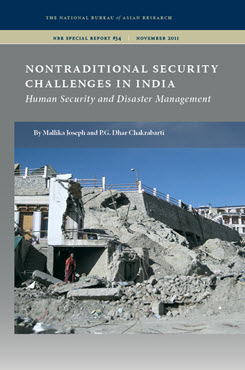Challenges of Disaster Management in India
Implications for the Economic, Political, and Security Environments
This essay examines the disaster management challenges in India and assesses the implications of those challenges for that country’s economic, political, and security environments.
EXECUTIVE SUMMARY
This essay examines the disaster management challenges in India and assesses the implications of those challenges for that country’s economic, political, and security environments.
MAIN FINDINGS
- In the past two decades, India’s public policy on disaster management has shifted from a focus on relief and rehabilitation efforts to holistic management of disasters. This new policy approach incorporates pre-disaster issues of prevention, mitigation, and preparedness, as well as post-disaster issues of response, recovery, and reconstruction.
- New initiatives, such as mainstreaming disaster risk reduction in development, building capacity through education and greater awareness at all levels, and utilizing advanced technologies, have enhanced India’s preparedness for each phase of disaster management.
- Unsafe building practices in rapidly growing urban settlements constitute one of India’s greatest challenges for disaster management. A major earthquake in any of India’s densely and heavily populated cities in seismic zones would be catastrophic in terms of fatalities.
- Climate change has far-reaching implications for managing disaster risk in India, as the frequency and intensity of flash floods, landslides, droughts, cyclones, and storm surges are expected to increase in upcoming decades.
POLICY IMPLICATIONS
- While significant achievements have been made in post-disaster response and reconstruction, there are still formidable challenges to reducing the risk of future disasters.
- Disaster management policies must incorporate programs to protect the most vulnerable segments of society—the poor, marginalized, women, children, disabled, and elderly.
- Mechanisms must be designed and adopted for transferring lessons learned for pre- and post-disaster management between communities.
- Given that natural disasters do not always follow national boundaries, cross-boundary issues of disaster management should be addressed through enhanced regional cooperation. Furthermore, an effective regional response system should be developed to pool capacity for mutual benefit.
- Left extremism is likely to be one of the most serious challenges to Indian security in the forthcoming decade if the government does not address basic issues of governance and accountability.


